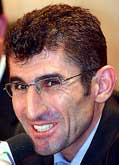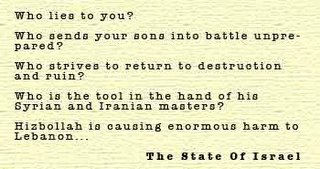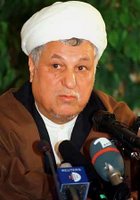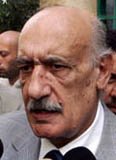Politics aside, let us focus on policy today.
What are the most contentious policy issues in Lebanon today? In other words, what is the essense of the political tension that Lebanon is experiening today?
- Lebanon's "contribution" to the Palestinian cause
- Lebanon's defensive posture against "Israeli aggression"
I highlight these two policy issues because they should be dominating political discourse in Lebanon today. Hizballah represents one side of the debate. Future leads representatives of the other side. Hizballah's argument is that its weapons assist the Palestinians in their goal to establish statehood and reclaim Jerusalem. It also argues that its military capabilities are a deterrent against Israeli aggression towards Lebanon.
My take on those two policy issues is different. Moreover, whereas some on my side of the aisle are shamed into silence by the other side's incessant call to do “whatever it takes” to help Palestinians, and prevent Israeli aggression, I say no! There are better ways to protect Lebanon and to help the Palestinians, and that healthy debate can only help those two policy objectives, rather than harm them.
Unfortunately, it does not appear that Hizballah's arms are meant solely to further those two policy objectives. Fellow blogger Anton at Across the Bay, Hani G. (who writes in this blog), and others have argued that Hizballah's arms have as much to do with local politics (inter-sectarian politics) as it does with national defense issues and the Palestine-Israeli conflict. I concur with that argument and with Hani's claim that Hizballah appears to want something in return for giving up its weapons. I also believe that Hizballah has a role to play in Iran's regional designs and that its weapons are an essential component of those designs.
Let's go back to policy though. Lets go back there because it is important that an effective and valid counter-argument to Hizballah's claims about the necessity of its weapons exists. For Lebanon to arrive at effective policies, there must always be at least two opposing sides on any policy issue. No one side must be shamed into silence because all will suffer from bad policy decisions, not just those who make them.
1. Are Hizballah’s weapons helping the Palestinian cause?
Hizballah's argument is that Lebanon should remain at a state of war with Israel, and utilize Hizballah's military capabilities rather than the Lebanese Armed Forces in conducting that war. The public reasoning it gives to Lebanese for relying on guerilla rather than conventional warfare is that the Israeli Armed Forces would wipe out the Lebanese state; but that if only Hizballah attacked Israel, then Hizballah will be targeted for retaliation, thereby sparing all other Lebanese.
Hizballah's arguement concerning the utility of violence
First we need to tackle whether military operations in general actually help the Palestinian cause before we deal with the type of military operations that are most suitable. In my opinion, violence does not help. It no longer helps, because there already is an international consensus for Palestinian statehood as well as some formula of joint-sovereignty over Jerusalem. Violence, rather than improve the Palestinian position on the bargaining table, has gradually eroded it. First we had Rabin, then Perez, then Netanyahu, then Barak and now we have Sharon. Israeli offers to the Palestinians progressively got worse with each of these leaders. The more violence Israeli society experienced, the more right-wing they voted.
I do not want to go into the details of the Oslo Accords and Palestinian-Israeli negotiations because a ton of literature already exists about them (from all perspectives). What I do want to get across is that there is no more need for violence. The entire world has come to an agreement that the Palestinians will get their state, which will share sovereignty over Jerusalem as well as control the West Bank and Gaza. Violence only prolongs the pathetic status quo.
Hizballah's argument concerning the means of conducting warfare.
Remember, Hizballah claims that its guerilla operations to assist Palestinians will spare the Lebanese state and people from violent retaliation by the Israelis. I also beg to differ in this regard. Any military activity conducted from or on Lebanese soil, no matter how limited, is damaging to all Lebanese becausem, at the very least, it scares away business activity from Tripoli to Tyre and Beirut to Ba'albek. This business activity could potentially have helped improve socio-economic conditions for hundreds, if not thousands, of Lebanese. Consequently, even though Israelis conduct most of their retaliations in Southern Lebanon, and attack "suspected Hizballah bases," Lebanon in its entirity feels the consequences of those strikes.
Recent history has also shown us that even though Hizballah suffers the burden of most Israeli retaliations, the Israelis do retaliate directly against the Lebanese state, and other Lebanese entities. I need say no more than point to Operation Grapes of Wrath, during which more than a hundred civilians were murdered in a UN compound, and power infrastructure throughout the country was targeted and destroyed by Israeli aircraft.
In conclusion, it appears that both of Hizballah's arguments for maintaining its own military capability and autonomy cannot stand on their feet. If the organization has other arguments, then I urge someone to bring them on the table so that we may have a rational debate concerning the Palestinian-Israeli Conflict and Lebanon's role in that conflict.
2. Do Hizballah's Weapons Enhance Lebanese National Security?
One of Hizballah's relatively new arguments for maintaining its weapons is that they deter the Israeli state from violating Lebanese sovereignty and from acting belligerently towards Lebanon. They argue that since Lebanon does not have a "shield" to protect itself from the Israeli "gun," Lebanon must also have its own "gun" pointed at Israel - a gun that the Israelis have no "shield" against. That Lebanese gun, they argue, must be Hizballah, since it has proven its mettle against the IDF by expelling it from southern Lebanon. Only if Lebanon possesses this particular gun will the Israelis think twice about violating Lebanese sovereignty and conducting illegal military activities on Lebanese soil.
Hizballah makes a stronger argument here than it does in its Palestine-Israeli argument. However, it crumbles in the face of demands that Hizballah merge with the Lebanese Armed Forces. The only difference between then and now is that there will be one chain of command that will ultimately lead up to the President of the Republic of Lebanon. Furthermore, unlike operations intended to “help the Palestinian cause," all states have the inherent right to protect their sovereignty, and consequently, the Lebanese Armed Forces will have the obligation to retaliate against any violent assault on Lebanese sovereignty to the best of its abilities.
Let me take this argument one step further. The Lebanese Armed Forces must also defend Lebanon from Syria. The duty of an Army is to prepare for all eventualities and have the means to deter all potential adversaries. For God's sake, the Canadian Armed Services have plans drawn up to defend against an American invasion!!! I don't know how much that would help, but it's still there! Therefore, allow me to recommend the following:
- Hizballah should join the Lebanese Armed Forces
- Once that process is completed, the Armed Forces should redeploy some of the short range missiles targeted at Tel Aviv to the Bekaa and redirect them at Damascus.
Concluding Remarks:
I have attempted to rationally debunk the three or four arguments Hizballah articulates for maitaining the status quo with regards to its weapons. Let us all assume that Lebanese policy is concocted only after rational deliberation. Therefore, let us debate the issue rationally as Lebanese, without emotions and sectarian prejudices. We would all be better off if politics in our country was conducted under such conditions. At least under these conditions Hizballah would have either already disarmed or convinced the majority of Lebanese of the necessity of maintaining its military capabilities.








